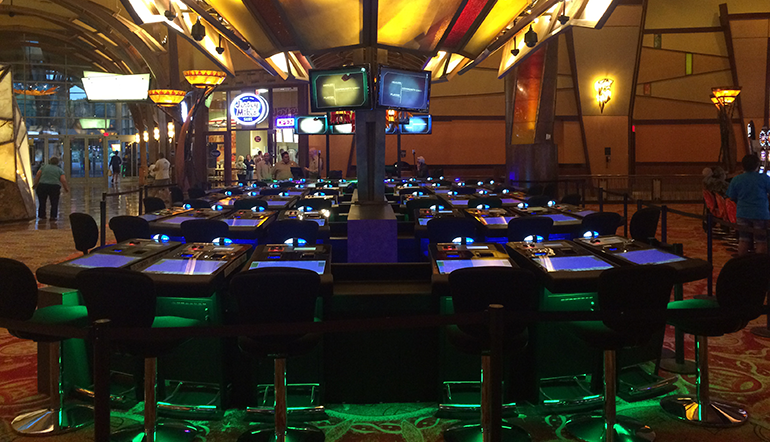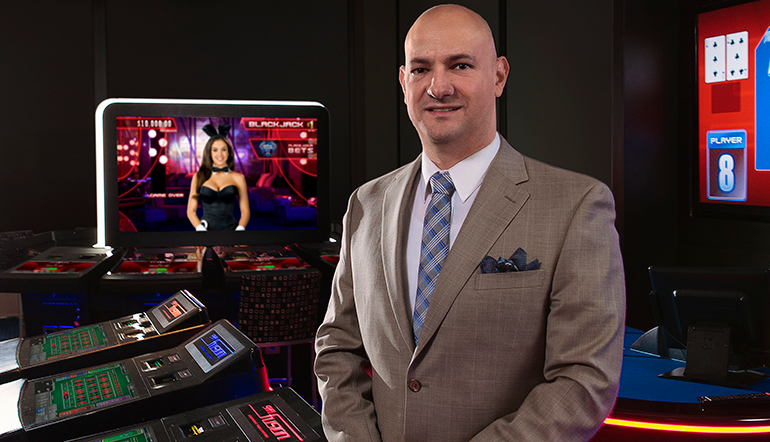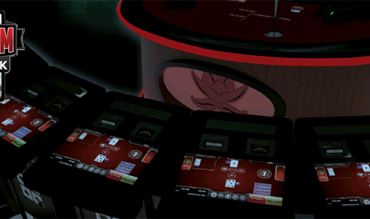Picture 44 electronic player terminals spread out in a stadium-configured arrangement in a casino. A live blackjack dealer stands in front of the stadium facing the players. Players (in this example, up to all 44) make their bets by touching the casino chips across the bottom of the screen on their interactive terminal. As soon as bets are made by the active players and a countdown timer reaches zero indicating that wagering is closed, a live dealer deals a single (common) hand of blackjack to all players, and deals one card to herself.
All of the players independently decide how they are going to play the same starting hand. After all the players have made their playing decisions, the dealer is prompted to deal another card and place it in the Community Location on the layout. As players stand or bust, the dealer’s hand is completed for their individual game screen as a result of each player’s decision. This means if one player stands, it may send the subsequent Community Cards to the dealer’s hand, while another player might hit and receive those cards toward his or her total, delaying when their dealer hand receives further cards. At the end of the round, once all players’ results are complete, the “Pays and Takes” are done automatically by the system, and a new round of betting opens.
If you think the above electronic blackjack game is something in the future of gambling you are wrong. The name of this new game is Fusion Hybrid Stadium Blackjack, and it has already been installed in several casinos in the U.S., including Venetian/Palazzo in Las Vegas, Mohegan Sun in Connecticut, Parx and Sands in Pennsylvania, and both Cache Creek and Barona in California. The Stadium Blackjack game is just one of several games available in the Fusion Hybrid system being marketed by Scientific Games Corporation. (Other games on the system include Baccarat, Roulette, Sic Bo, and, coming very soon, Stadium Casino War).

To get the lowdown on this new high-tech way to play blackjack, I visited the Stadium Blackjack installation at the Venetian/Palazzo casino in Las Vegas and also visited with Mr. Gabriel Baron, General Manager and Senior Director of ETS Product Management at the Scientific Games offices in Las Vegas. The way the game is played is as follows:

Players take a seat at any terminal. After they deposit their money (it shows up as credits on the bottom of the screen), they can decide how much to bet by touching or dragging the casino chips from the bottom of their screen onto the main betting spot, as well as onto the optional side bets available — Royal Match 21, Bet the Set 21, and King’s Bounty.
A single hand of blackjack is dealt by the live dealer along with a dealer’s up card. Each player uses the touch-screen buttons to indicate how to play blackjack with that specific hand (i.e., stand, hit, split, or double down; some casinos also give players the option to surrender). Some players may decide to hit; others might stand, or perhaps split or double down; essentially, each player can “do his or her own thing.”
Community cards are dealt by the dealer, and these cards are used to complete hands for the players (who hit, double down, or split), and for the dealer’s hand against each player, as appropriate. After all the hands are reconciled against the dealer’s hand for their situation, the system automatically “collects” losing bets and “pays” winning bets. (Below is a copy of the Stadium Blackjack Rules of Play provided by Scientific Games.)
STADIUM BLACKJACK RULES
Stadium Blackjack is a variation of a blackjack game wherein each player places a wager on their own player terminal, and the results of the game are determined by a live dealer utilizing community cards to reconcile player decisions.
- The (live) dealer will begin the betting round by pressing “New Game” on the dealer terminal touch screen.
- Each player places a wager on the main betting location, in addition to any side bets he or she wish during this betting window.
- When the countdown timer expires, the dealer will deal one card on the layout to the “Player” location, one to the “Dealer” location, and a second card to the “Player” location.
- The players will then be able to make their decisions based on their two cards vs. the dealer’s one card.
- Each player terminal makes an independent decision on that hand.
- After all player decisions have been made, the dealer terminal prompts the dealer to draw a card and place it in the “Community” location on the layout.
- For players that hit their original hand, this card becomes their hit card.
- For Players that split their original hand, this (same) card becomes the next card on the first split hand.
- For players that Doubled Down, this (same) card becomes their double down card.
- For players that stood their original hand, this (same) card becomes the dealers’ second card.
- For players who have split or hit, additional decisions continue and the dealer will continue to draw cards as prompted to the “Community” location on the layout until such time that all active player hands have been reconciled in addition to the resulting dealer hands that occur based on the decisions made.
- The Dealer then presses “Confirm” to end the round. Pays and Takes are done automatically by the system.
What makes Stadium Blackjack unique is that all the active players start with the same starting hand against the same dealer’s up card, yet, because of the way the community cards are distributed to complete the players’ and dealer’s hands based on the playing decisions made by each player, at the end of a round each player could have a different final hand against a different final dealer’s hand and a different outcome. For example, suppose the live dealer deals a pair of 8s for the Player’s Hand and a 10 up card for the Dealer’s Hand. For simplicity, I’ll assume three active players and each player decides to play his or her hand differently.
- Player A stands on the 8s (16)
- Player B hits the 8s (16)
- Player C splits her 8s
The following table summarizes how the system would distribute the Community Cards dealt by the dealer for Players B and C (Player A stood), and for the Dealer’s Hands for A, B, and C.
Based on the playing decisions made by each player:
- Player A stood with 16 and won because the A dealer’s hand busted (23)
- Player B hit and ended up with 21 but lost to B dealer’s blackjack hand
- Player C split the 8s, drew cards to each split hand, and ended up with 21 on the first split hand and 18 on the second split hand. Both hands won because the C dealer’s hand busted (23)
| Cards | A total | A action | A dealer | B total | B action | B dealer | C total | C action | C dealer | |
|---|---|---|---|---|---|---|---|---|---|---|
| Sranding Hand | 8-8 | 16 | stand | 10 | 16 | hit | 10 | 16 | split | 10 |
| 1st community hand | 5 | 16 | - | 15 | 21 | stand | 10 | 13, 8 | hit first | 10 |
| 2n community hand | A | 16 | - | 16 | 21 | - | BJ | 14, 8 | hit first | 10 |
| 3rd community hand | 7 | 16 | - | 23 | - | - | - | 21, 8 | hit second | 10 |
| 4th community hand | 10 | - | - | - | - | - | - | 21, 18 | stand | 10 |
| 5th community hand | 5 | - | - | - | - | - | - | 21, 18 | - | 15 |
| 6th community hand | 8 | - | - | - | - | - | - | 21, 18 | - | 23 |
| Player A won | Player B lost to BJ | Player C won both split wagers | ||||||||
The advantages of Stadium Blackjack for casinos are:
- Only one dealer is required to deal the cards for up to 300 players (the maximum players who can connect per server used) resulting in lower overhead costs
- The game is fast, resulting in more hands dealt per hour, more player excitement on the casino floor, a community feel amongst players especially when strong starting hands are dealt, and more casino profits
- Allows the casino to offer a low-limit blackjack game to all players, while keeping higher limits on live tables for players who prefer it. (For example, at the Venetian, the minimum betting limit on Stadium Blackjack was $5 whereas it was $15 and mostly $25 on the traditional blackjack tables.)
- The system gives totally accurate accounting of the player’s action and wager amounts, as well as wins and loses
- Casinos have a lot of flexibility in choosing the parameters offered — they can determine the number of decks of cards, the dealer drawing rules, the blackjack payout, and the minimums and maximums of each side bet offered, among other things
Some advantages for players include:
- Players are not intimidated by others when they make their playing decisions — the player at third base who “takes the dealer’s bust card” is no longer in danger of ridicule or hearing from the table expert who “knows the book”
- Great game to play for couples or if you are with a group — sharing in wins when dealt strong starting hands that get played in the same way, or being dealt Blackjack where everyone wins together really amps up the experience
- Players can play more than one game simultaneously, and where available, not just Stadium Blackjack but also Roulette, Baccarat, Sic Bo, and the future Stadium content being built by Scientific Games
- The system automatically keeps track of each player’s total and how their decisions have affected their personal game — there’s no miscounting of totals possible
- Players can take a break anytime and then jump back in and play whenever they’re ready — they can print tickets and not have to leave a stack of chips on the felt
- Players can use the same basic playing strategy to play their hand as they would at a traditional blackjack game — nothing in the game differs from a live table, and all the rules are configurable by the casino with most or all them being the same as found at a live game
There are some pitfalls to Stadium Blackjack. They include a winning blackjack hand being paid at only 6-5 (but this is configurable; this was the case at Venetian whereas at some other casinos it pays the usual 3-2); the hands are played rapidly, meaning more hands are dealt per hour resulting in a higher hourly theoretical loss for players; and card counting is eliminated because the discards from each round are placed back into the continuous shuffler.
In addition, there are two rules for Stadium Blackjack that you should be aware of:
- Players can only split up to a maximum of three hands, and this rule can’t be altered by a casino. (Reason: The player interface screen doesn’t have enough space to show all the cards for a fourth split.)
- A player will lose all busted bets, plus one unit, if the dealer gets a blackjack. This is a common rule in Australia and is known as BB+1. For example, if a player splits 8’s to three hands, resulting in an 18, a 19 on a double down, and a 23 (busted hand), the player will lose two units, one for the busted hand and one from the remaining three units wagered.
If you happen to be at one of the casinos that offer Stadium Blackjack, take a look-see at this hi-tech game because this might be how blackjack will be played in the near future in all casinos.
TIP:
If you are going to play Stadium Blackjack for fun, I strongly recommend you bring a basic strategy card with you when you play and refer to it so that you will always be making the correct playing decision. But be careful because the system has a timer and you typically have only 10 seconds to make a playing decision and hit the appropriate decision button (Hit, Split Double, etc.); otherwise, in most instances, it will automatically Stand on your hand unless you total 11 or less.
Note: I’d like to thank Mr. Baron for patiently taking the time to explain Stadium Blackjack to me, and for providing information for this article.
Henry Tamburin is a well-known blackjack expert and writer. He is also the author of the Ultimate Blackjack Strategy Guide.
